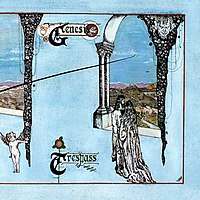thanks to the original releaser! 

Review (Wiki)
Trespass is the second studio album by Genesis and was recorded and released in 1970. The only album with drummer John Mayhew and the last with guitarist Anthony Phillips, Trespass had a folk-flavoured progressive rock sound that was a marked departure from their earlier work, and foreshadowed the path the band would follow through the 1970s.
The compositions were generally much longer and complex than before, featuring several different musical sections. The sound evokes a kind of 'pastoral English idyll' espoused by numerous progressive rock bands of the time. To this end, much use is made of multi-tracked 12-string acoustic guitars, blended with folky vocal harmonies, flute, acoustic piano, and gentle keyboard pads on Hammond organ and mellotron. The drum playing is generally fairly soft, which actually complements the atmosphere, although the band were unhappy with John Mayhew's skills and replaced him with Phil Collins following Trespass' completion and Anthony Phillips' departure.
Despite its generally muted, pastoral, folky feel, the album is not without dynamic moments. Peter Gabriel's vocals are soulful and angst-ridden throughout, particularly at the climax of "Stagnation", which also includes a prominent Hammond organ solo from Tony Banks. Closing track "The Knife" is aggressive and bombastic, featuring some biting lyrics from Gabriel, with Mike Rutherford playing fuzz bass. The song, which received great praise by The Nice's Keith Emerson,[citation needed] became a favourite closer to live shows and appeared - with lyrical changes - on Genesis' 1973 first live album Genesis Live.

| QUOTE (SH forums): | There have been comments made about the MCA having shortened endings on all tracks. In fact, the Canadian MCA has longer reverb tails on all tracks than the V/C or the DE. The impression of being shortened is due to two reasons: (a) the reverb tails are abruptly cut off instead of smoothly faded out, and (b) there are shorter silent gaps between tracks compared to the V/C and DE. If you give the reverb tails on the Canadian MCA smooth fadeouts, you end up with endings very similar to the DE. It is actually the V/C that has the most shortened endings.
The MCAs are generally agreed to be brighter-sounding than the V/Cs. Opinion is divided as to which version sounds better. |
|


